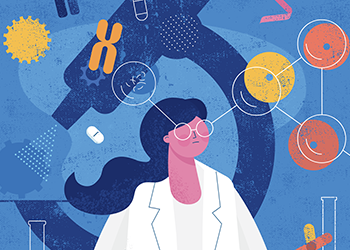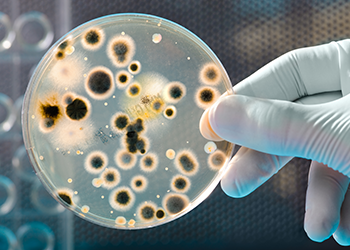A core aim of the Research Themes is to “promote collaboration and interaction across traditional departmental boundaries”, and through feedback from Group Leaders across the School we are now identifying areas of synergy that will enhance research and drive innovation. Referred to as ‘Grand Challenges’, these focussed research topics are scientifically ambitious, naturally span disciplines, and can be developed towards collaborative grant proposals and philanthropic engagement.
A summary of the current and emerging Grand Challenges across the Research Themes are highlighted below. We welcome opportunities to collaborate with industry partners, policy makers and academics. If you are interested in working with us, please contact Dr Abi Herrmann, Research Strategy Manager.
Women's Biology and Health
Understanding the fundamental mechanisms of women's biology is essential to improving lifelong health, benefiting women and supporting intergenerational health outcomes.
Pioneering Precision with Nanomedicines
Researchers in the School of Biological Sciences and across Cambridge are driving innovation in nanomedicine, drug delivery, and precision medicine.
Antimicrobial Resistance: next-generation strategies for a changing threat
Antimicrobial Resistance (AMR) is a global challenge, where bacteria are becoming resistant to the antibiotics that once killed them, making infections harder to treat.
Mental health and illness across scales, species, and society
Just as breakthroughs in our understanding of cancer required interdisciplinary insights into basic biomedical mechanisms, a leap forward in our approach to tackle mental health must traverse disciplinary boundaries – linking across scales, species and society.
Advanced Immunotherapeutics: the future of health
Immunotherapy is revolutionising healthcare. By harnessing the power of the body’s immune system, scientists are developing new strategies to tackle many diseases with high unmet need, including cancer, neurodegeneration and inflammatory disease.
Integrative biology of ageing
The Integrative Biology of Ageing is a multidisciplinary approach embedded at the University of Cambridge to increase understanding of the ageing process and develop strategies for extending human healthspan.
Further areas of focus
Machine Learning, AI and Biology
The integration of Machine Learning and AI with the brightest minds in the biological sciences unlocks immense potential for groundbreaking discoveries. Scientists in the School of Biological Sciences are harnessing the power of machine learning and large-scale data to drive innovation across three core areas: breakthrough biology; transforming health; and environmental resilience.
Microbiome research for human, animal and planetary health
Unlocking the secrets of the microbiome offers immense promise for improving human, animal, and planetary health. The microbiome refers to the diverse community of microorganisms, including bacteria, viruses, and fungi, living within and on our bodies, as well as around us in the environment.
Cambridge researchers from across disciplinary boundaries are working together to understand and harness the power of these tiny organisms to drive a step change in our understanding of human and animal health. Moreover, recognising how human activities impact the planet's microbiomes can guide sustainable environmental practices and promote biodiversity, delivering a healthier plant where all can thrive.
Complex tissue regeneration across scales and systems
Embryos and plants show us that multi-tissue regeneration is possible, however complex animals and humans have mostly lost this capability. Researchers in Cambridge are working together to learn lessons across tissues, systems and scales to make human limb and organ regeneration possible.
Breakthrough Biology for Cancer Research
Fundamental research into the biological causes and drivers of cancer is vital to deliver scientific progress in this priority area of human health. Researchers from the School of Biological Sciences and the wider University are working together across disciplines to develop innovations and insights at the frontiers of cancer biology, laying the groundwork for the development of accurate diagnostic tools, preventative strategies and personalised cancer treatments.
The two current areas of focus are: Discovering the biological blueprints of cancer and Fighting cancer with the immune system.
Life at the Extremes
'Life at the Extremes' encompasses the exploration of organisms, people and societies that exist in environments that are considered exceptionally challenging or harsh, such as extreme temperatures, high altitudes, areas of low nutrient availability and societies recovering from natural disasters. Working together across disciplinary boundaries, Cambridge researchers are delivering new knowledge on the rules of life in extreme environments. Growing our understanding of the biology or resilience in these extreme environments offers important new opportunities to shape the future of resilient life, climate responses and global health.
Revolutionising Evolutionary Biology: the Network of Life Approach
Since Charles Darwin popularised the concept of the ‘Tree of Life’, the branching model of evolution has been widely acknowledged as a central principle in modern biology. Researchers in Cambridge are now challenging this thinking, recognising that many evolutionary processes, from genetic inheritance through to language and cultural evolution, are better represented as interconnected networks rather than a branching tree, termed the 'Network of Life'
Through dynamic and collaborative research across biological and cultural evolutionary systems, we aim to gain a deeper understanding of these networks of evolution which can drive a paradigm shift in modern evolutionary biology.
Changing pathogens in a changing world
Growing human populations, environmental shifts and increasing international movement are the recognisable features of our changing world, and are contributing factors to the emergence, resurgence, and redistribution of many infectious diseases. Cambridge researchers are working across disciplinary boundaries to understand how pathogens are responding to our changing world. Working collaboratively and in partnership with affected communities, we will deliver effective strategies to protect our planetary health and the global community across future generations.
Seeing infection through a new lens
The ability to visualise host-pathogen interactions across multiple scales, from individual molecules to whole organisms, unlocks unprecedented opportunities for breakthroughs in our basic understanding of infectious disease biology. However, working with live human or animal pathogens also brings unique challenges. By sharing experiences, skills and resources, researchers in Cambridge are redefining what is possible in infections disease imaging and illuminating novel biological processes that can be targeted for the development of next-generation therapies.







